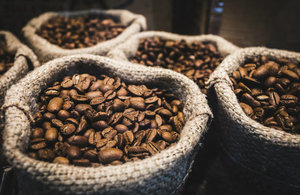Collaborating with Queen’s University to improve coffee authenticity
The Government Chemist and Queen's University Belfast have published a paper highlighting current analytical difficulties in authentication of coffee and possible solutions

Coffee beans are a high value product, subject to fraudulent practices
Coffee authenticity has been a topic of interest for the Government Chemist and its collaborators for quite some time, resulting in the publication of a paper in 2017 reviewing analytical methods to detect adulteration in coffee.
Following developments in analytical techniques, and on request by the publishing journal, Dr Michael Walker and Professor Duncan Thorburn Burns, Emeritus Professor in the Institute for Global Food Security have published an update of the original paper.
The updated paper reviews the driving factors for the commercial adulteration of coffee and analytical methods for detecting different fraudulent practices:
-
dilution: adulteration of coffee with cheaper materials such as coffee husks, chicory, cereal grains, woody tissue, cocoa or soya beans, acai berries or exogenous sugars
-
incorrect geographic origin stated in label
-
substitution of the more expensive Arabica with cheaper beans
-
authenticity of Kopi Luwak coffee (coffee produced from beans digested by civet cats)
A flow diagram, has been developed to summarise the best approaches to deal with the authentication of coffee. Encouragement is given to the interlaboratory validation of spectroscopic approaches, the exploration of civet cat DNA for the identification of Kopi Luwak, and the development of appropriately large and well-curated datasets of authenticity information across multiple techniques.
For more information about the work of the Government Chemist contact
Government Chemist
Priestley Building
10 Priestley Road
Guildford
Surrey
GU27XY